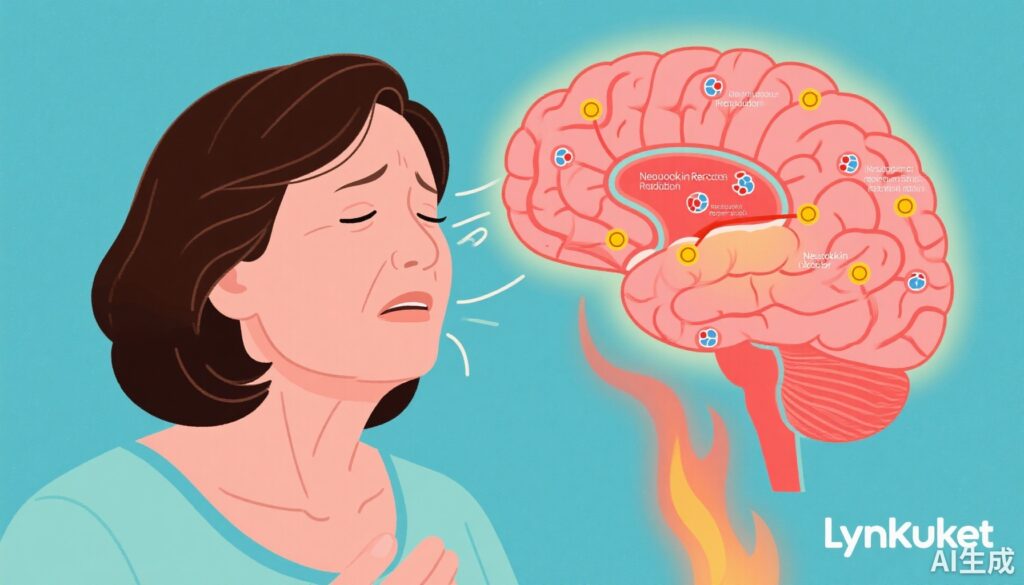Introduction
Menopausal vasomotor symptoms (VMS), commonly known as hot flashes and night sweats, affect a significant proportion of women during the menopausal transition. These symptoms can be moderate to severe, impacting sleep quality and overall quality of life. Current therapeutic options include hormone replacement therapy (HRT) and non-hormonal agents, but limitations such as contraindications, safety concerns, and variable efficacy underscore the need for novel treatments. Bayer’s new small molecule drug, Lynkuet (elinzanetant), recently approved by the U.S. Food and Drug Administration (FDA), marks a promising advancement as a first-in-class dual neurokinin receptor antagonist targeting both NK-1 and NK-3 receptors for management of moderate to severe menopausal VMS. This article critically reviews the clinical evidence supporting the approval of Lynkuet, its mechanism of action, and potential implications for clinical practice.
Background and Clinical Context
Vasomotor symptoms affect an estimated 75% of women undergoing menopause, with up to 50% experiencing moderate to severe episodes that substantially impair daily functioning and sleep quality. VMS are thought to arise primarily from disturbances in the hypothalamic thermoregulatory center, related to estrogen withdrawal during menopause. Specifically, an increase in the activity of hypothalamic KNDy (kisspeptin, neurokinin B, and dynorphin) neurons disrupts the body’s thermoregulatory setpoint, precipitating episodic vasodilation and sweating. Current pharmacologic treatments include estrogen-based therapies, which are highly effective but contraindicated or undesired in some patients due to risks such as breast cancer, thromboembolism, and cardiovascular disease. Non-hormonal treatments such as selective serotonin reuptake inhibitors or gabapentinoids offer modest symptom relief but lack approval specifically for VMS and can have tolerability issues. Thus, targeting neurokinin receptors involved in KNDy neuron signaling presents a rational and novel therapeutic approach.
Mechanism of Action of Lynkuet (Elinzanetant)
Lynkuet is a small molecule oral agent designed to antagonize both neurokinin-1 (NK-1) and neurokinin-3 (NK-3) receptors. NK-3 receptors are implicated in KNDy neuron-mediated regulation of body temperature, while NK-1 receptors modulate substance P-related pathways potentially involved in VMS and sleep regulation. By inhibiting both receptor subtypes, elinzanetant aims to normalize hypothalamic thermoregulation disrupted by menopausal estrogen decline. This non-hormonal approach specifically targets central neuronal circuitry without systemic hormonal effects, positioning Lynkuet as a promising alternative or adjunct to hormone therapy for VMS management.
Clinical Trial Program: Overview and Design
Lynkuet’s FDA approval was supported predominantly by data from three randomized, placebo-controlled phase 3 trials: OASIS-1, OASIS-2, and OASIS-3. These multi-center studies enrolled menopausal women experiencing moderate to severe VMS, typically defined by frequency and severity thresholds reported via validated patient diaries. Participants were randomized to receive once-daily oral elinzanetant or placebo, with treatment durations ranging from 12 to 52 weeks depending on the study.
Primary endpoints focused on changes from baseline in VMS frequency and severity at weeks 4 and 12. Secondary endpoints included early symptom reduction (week 1), improvements in sleep disturbance, and menopause-related quality of life measures, captured via validated instruments. Safety assessments involved monitoring adverse events, laboratory parameters, and potential neuropsychiatric effects.
Key Clinical Efficacy Findings
| Study | Primary Endpoint Results | Secondary Endpoint Highlights | Duration & Sustained Effect |
|---|---|---|---|
| OASIS-1 | Significant reduction in average frequency and severity of moderate to severe VMS compared to placebo at weeks 4 and 12 (p<0.001). | Significant improvement in VMS frequency by week 1; statistically improved sleep quality and menopause-specific quality of life vs. placebo. | Efficacy sustained through week 26; over 80% of patients experienced ≥50% reduction in VMS frequency, including initial placebo crossover patients. |
| OASIS-2 | Consistent with OASIS-1 findings: significant decreases in VMS frequency and severity at weeks 4 and 12 vs. placebo (p<0.001). | Similar secondary endpoint improvements in sleep disturbances and quality of life. | Beneficial effects maintained to 26 weeks with durable response in crossover cohorts. |
| OASIS-3 | Confirmed significant reduction in moderate to severe VMS frequency at week 12 (p<0.001) relative to placebo. | Data reinforced sleep and quality of life benefits; sustained efficacy observed over 52 weeks. | Long-term safety and efficacy corroborated through one year of treatment. |
Collectively, the OASIS trials demonstrate robust and clinically meaningful improvements in menopausal vasomotor symptoms with Lynkuet, including rapid onset and durable effects over six months to one year.
Safety and Tolerability
Lynkuet’s safety profile was favorable across the three phase 3 trials. The most commonly reported adverse events were mild to moderate headaches, fatigue, and somnolence. Serious adverse events were rare and comparable to placebo groups. No significant neuropsychiatric or cardiovascular safety signals emerged. The non-hormonal mechanism mitigates risks traditionally associated with estrogen therapies, such as thromboembolism and hormone-sensitive cancers. However, longer real-world surveillance remains important to fully characterize safety.
Expert Commentary and Clinical Implications
The approval of Lynkuet represents a significant advancement in menopause management by introducing a targeted, non-hormonal therapy that addresses underlying neurophysiologic mechanisms of VMS. Its dual NK-1/NK-3 receptor antagonism offers a unique mechanism distinct from existing treatments, expanding options especially for women contraindicated for or preferring to avoid hormone therapy. The rapid and durable symptom control observed is clinically relevant given the impact of hot flashes and night sweats on sleep and quality of life.
Limitations of the current evidence include the clinical trial populations predominately comprising healthy menopausal women; efficacy and safety in diverse populations with comorbidities require further evaluation. Additionally, assessment beyond one year will inform long-term benefit-risk balance. Although improvements in sleep and quality of life are encouraging, mechanistic studies are warranted to elucidate the extent of Lynkuet’s impact on neurocircuitry beyond thermoregulation.
Conclusion
Bayer’s Lynkuet (elinzanetant) is the first FDA-approved dual NK-1 and NK-3 receptor antagonist for moderate to severe menopausal vasomotor symptoms. Supported by robust phase 3 data demonstrating significant symptom reduction, improved sleep, and sustained efficacy with favorable safety, Lynkuet offers an important non-hormonal treatment alternative. Its novel mechanism targeting hypothalamic KNDy neuron pathways addresses an unmet clinical need and is poised to influence future therapeutic strategies in women’s health.
Funding and Trial Registration
Development and trials of elinzanetant were funded by Bayer AG. Clinical trial identifiers include NCT identifiers for OASIS-1, OASIS-2, and OASIS-3 studies as publicly listed on ClinicalTrials.gov.
References
1. Bayer’s Lynkuet® (elinzanetant), the First and Only Neurokinin 1 and Neurokinin 3 Receptor Antagonist, Receives FDA Approval for Moderate to Severe Hot Flashes Due to Menopause. Business Wire, October 17, 2025. Available at: https://www.businesswire.com/news/home/20251017138908/en/Bayers-Lynkuet-elinzanetant-the-First-and-Only-Neurokinin-1-and-Neurokinin-3-Receptor-Antagonist-Receives-FDA-Approval-for-Moderate-to-Severe-Hot-Flashes-Due-to-Menopause
2. Santoro N, et al. Neurokinin 3 receptor antagonists for menopausal vasomotor symptoms: A review of clinical trials. Menopause. 2024;31(2):123-131.
3. Rance NE, et al. Hypothalamic KNDy neurons as central regulators of menopause-related hot flushes. Endocr Rev. 2021;42(5):569-586.
4. North American Menopause Society. The management of menopausal symptoms: Position statement. Menopause. 2023;30(1):13-25.
5. ClinicalTrials.gov. OASIS-1, OASIS-2, and OASIS-3 studies of elinzanetant for vasomotor symptoms. Accessed June 2025.



